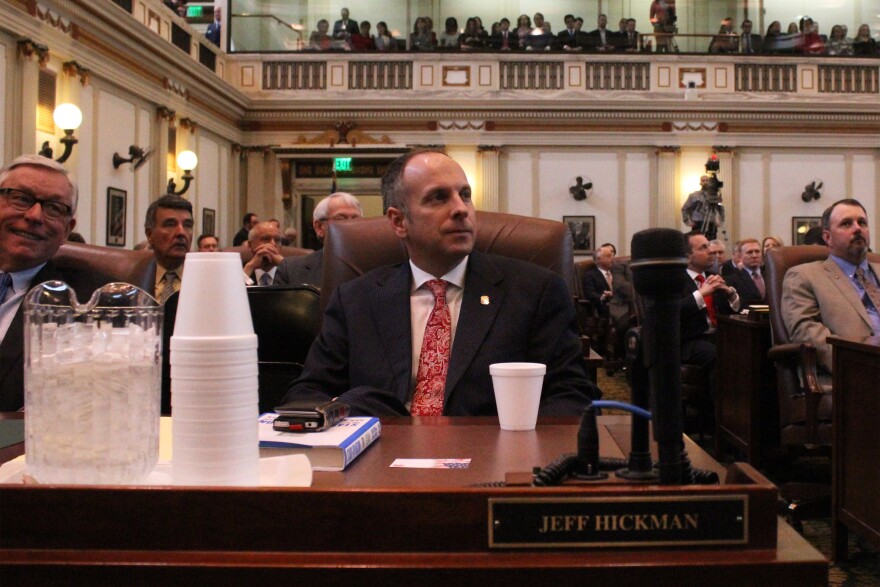Oklahoma House and Senate leaders have introduced legislation that would require thorough reviews every four years of several dozen business incentives that are costing the state as much as $300 million annually.
Companion bills authored by House Speaker Jeff Hickman, R-Fairview, and Senate President Pro Tem Brian Bingman, R-Sapulpa, would create a seven-member Incentive Evaluation Commission to conduct the quadrennial reviews.
The legislation would not mandate a true “sunset” process, as required in some states. It would not require the legislature to reauthorize each business incentive on a regular basis, only to review the commission’s analyses and recommendations. Some Oklahoma tax breaks already are subject to sunset requirements, but many aren’t.
The biggest-ticket subsidy that would be included in the reviews is the Quality Jobs Program, which generally covers 5 percent of the cost of wages paid to new workers hired in certain manufacturing industries. Last year the program reduced state tax collections by $82 million.
“One of the things that everyone has been talking about is that we should have mechanisms to be able to evaluate various incentives,” said Oklahoma Finance Secretary Preston Doerflinger, who represented Gov. Mary Fallin’s office in the bill discussions. “I really think this is the tool that everyone has been asking for.”
The review process would contain at least two notable exceptions, Doerflinger and other officials acknowledged.
It would not include a new rate structure enacted last year that reduced the gross production tax rate on newly-drilled oil and gas wells to 2 percent during their first three years of production.
It also would not encompass the state’s reimbursement of five-year property tax exemptions provided by counties to manufacturing facilities.
Nonetheless, key lawmakers and national experts said the legislation represented a groundbreaking first step toward better oversight of dozens of tax breaks, rebates and other business incentives that have been growing at a rapid rate in recent years.
“I think Oklahoma is really poised to become a leader in this area,” said Jeff Chapman, project director of the Business Incentive Initiative being conducted by the Pew Charitable Trusts, a Washington-based research group.
“Most or all states are sort of dealing with these same issues,” Chapman said. “I think a lot of states will be looking to Oklahoma to see how they can follow suit … It’s a huge step.”
The Pew Trusts and another nonprofit group, the Center for Regional Economic Competitiveness, have been working with officials in Oklahoma and five other states over the past year to develop model programs for evaluating business incentives.
Fallin was among a group of governors who applied in late 2013 to participate in the Business Incentive Initiative. Although Pew said in a report issued last year that Oklahoma was one of 26 states that were “lagging behind” in oversight efforts, Chapman said state officials and key lawmakers are now enthusiastic about adopting better practices.

Oklahoma Watch published a data analysis last year showing that two dozen key business tax subsidies had more than doubled in cost over the previous four years and had reduced state revenue collections by $760 million in fiscal year 2014.
But that analysis included a number of gross production tax incentives that have been replaced by the new tax rate structure, which would not be subject to reviews. It also included the cost of the property tax reimbursements to the counties, which also would be exempt. If those items were removed from the data analysis, the annual cost to the state would have been closer to $300 million.
The actual list of incentives that would be subject to reviews would not be finalized until January 2016. But the language of the legislation is expansive, and officials said the Quality Jobs Program definitely would be included.
The seven-member commission proposed in the Hickman and Bingman bills would consist of a governor’s office appointee, House appointee, Senate appointee, state treasurer and the three members of an existing Incentive Approval Committee.
The commission would be directed to submit a list of incentives subject to reviews by Jan. 1, 2016. Each incentive would be reviewed once every four years, on a staggered timetable. The first set of reviews would be completed by Nov. 1, 2016.
The reviews would include estimates of the economic and fiscal impact of each incentive and the extent to which it changes business behavior and accomplishes its intended goals.
A frequent criticism of such incentives is that they might simply reward companies for creating jobs they would have been created anyway, while reducing tax revenues that could have been used to support education, health, corrections, transportation and other state services.
House Appropriations and Budget Committee Chairman Earl Sears, R-Bartlesville, said he was pleased with the Pew legislation, but wished the state would impose even more stringent oversight of business incentives.
“It’s not to the depth that I’d like, but at least it’s a start,” Sears said. “The reason I’m supportive of it is because we have no review, none whatsoever, in place right now. None. Zero.”
-----
KGOU relies on voluntary contributions from readers and listeners to further its mission of public service to Oklahoma and beyond. To contribute to our efforts, make your donation online, or contact our Membership department.





